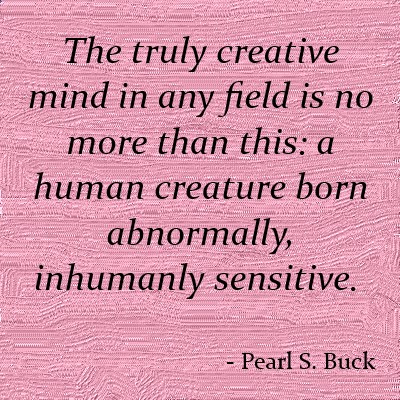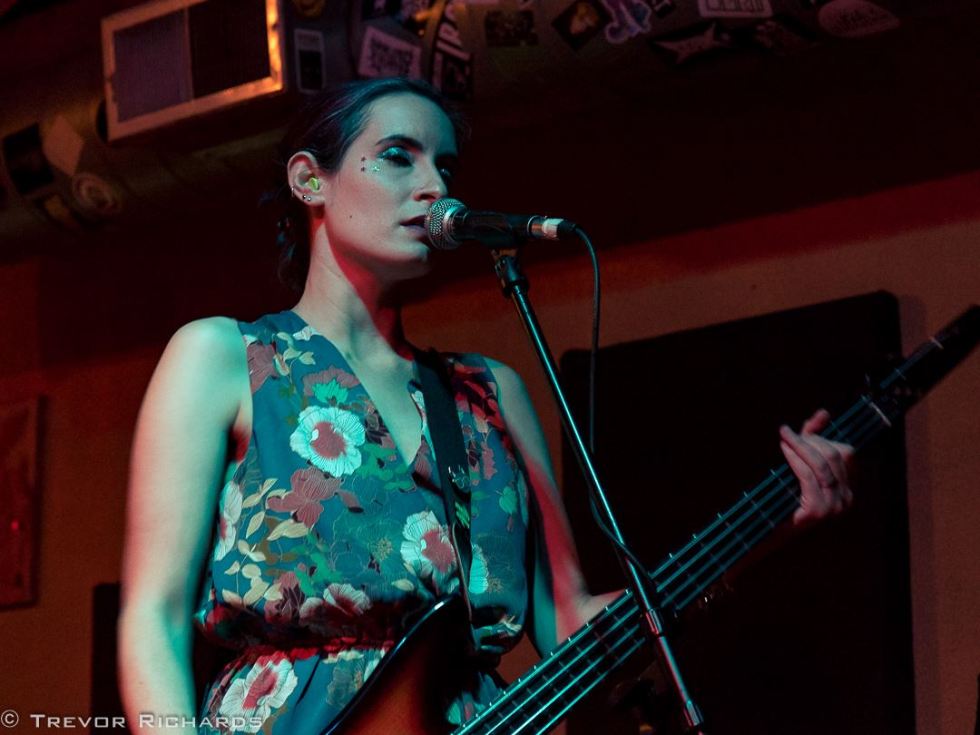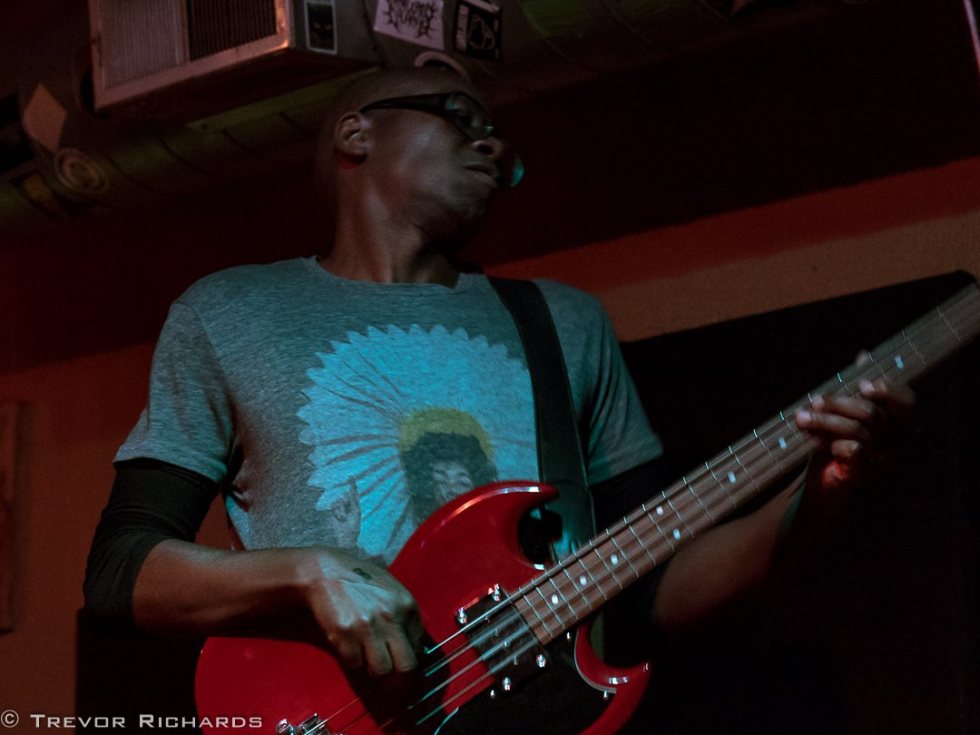We’ve talked a lot about depression among musicians. “Music is hard,” we said – why wouldn’t we be depressed? “Depression affects a lot of people, and so a lot of musicians” – it’s serious, complex, and common! All along, inquiring minds have wondered: What’s the connection between creativity and depression (or other forms of mental illness, or “madness” as people who write titles for articles on this topic so often say for sensationalizing effect)? More simply: Why do musicians and other creative people seem to be more prone to depression?
We’ve surveyed musicians, interviewed musicians, and talked about depression among musicians – all in an effort to gain insight into this connection. We’ve touched upon the answer, but never made full contact – not yet made any bold claims. But today we will (well, at least we’ll start)!
Based on the research I’ve done (articles, books, personal experience, and talking to musicians), I say the connection is sensitivity.
Today we’ll take a look at what musicians have to say about the connection between creativity and depression, and we’ll learn a little about what sensitivity is.
I didn’t want to do this because almost every article I’ve read about creativity and sensitivity has used this quote, but I’m also going to use this quote by award-winning writer Pearl S. Buck. It’s too perfect and explanatory to bypass for the sake of not sounding trite.

The truly creative mind in any field is no more than this: a human creature born abnormally, inhumanly sensitive. To him, a touch is a blow, a sound is a noise, a misfortune is a tragedy, a joy is an ecstasy, a friend is a lover, a lover is a god, and failure is death. Add to this cruelly delicate organism the overpowering necessity to create, create, create — so that without the creating of music or poetry or books or buildings or something of meaning, his very breath is cut off from him. He must create, must pour out creation. By some strange, unknown, inward urgency he is not really alive unless he is creating.
– Pearl S. Buck
The Connection Between Creativity and Depression, According to Musicians
What do you think? Is the connection between creativity and depression sensitivity? We asked musicians (and music-lovers) to tell us their thoughts on the connection between being a musician and experiencing depression. Here’s an interesting sampling of answers that backs up the claim that the connection is sensitivity, based on the lived experience of musicians.

Close to 50 musicians in the Pittsburgh, PA area (and beyond – as far as Seattle, WA!) have answered our survey about musicians and depression. If you’d like to contribute your answers, take our short, anonymous survey here. We’ve also interviewed several musicians and learned a lot about the connection that way. Check out our interviews here.
We asked, “Do you think there’s a connection between being a musician and experiencing depression?”
You answered:
I think that people who are apt to be musicians – particularly those writing their own music – are more apt to be sensitive. Those people are more apt to become depressed. But I also think that being a musician – and music in general – is healing.
I think an artist mind is one that’s full of emotion. There is more room for depression in someone who is creative.
Probably being a sensitive ball of emotions makes you more susceptible to connecting with art and music as a way to express, transform, channel, empathize, [and] construct emotional energy.
I don’t know. I think artistic people seem to feel a sadness and loneliness that feels a little more present. Maybe they’re just more in touch with that side of themselves because they exercise that muscle more. I’d be shocked to feel like a person working manual labor doesn’t feel that same kind of pain and existential longing. It’s probably just felt or expressed in other ways.
I feel many artists experience [depression], whether it’s from artists feeling things differently and perhaps more intensely.
I believe that people who are creative are more perceptive and more sensitive and thus more likely to be depressed. It’s not about being a musician, specifically. I know musicians who are not very creative.
Highly intelligent, creative individuals often see the world differently than other people. They pick up on the patterns, the connection, and the space between ideas, events, and interactions. This heightened sense of understanding often creates tension in the individual and can serve as a basis for depression.
I think that musicians tend to feel feelings more fully than other people.
The major themes in these responses are: 1) creative people perceive things in their environments and within themselves differently than others; 2) creative people feel things in their environments and within themselves more deeply than others; 3) this different perception and deeper feeling provide fuel for creativity; 4) and this different perception and deeper feeling provide fodder for depression and other overwhelming feelings.

It’s like the respondents to this survey just got done reading a book on creativity, depression, and sensitivity. These respondents were spot on according to the research!
What is Sensitivity?
Well, we’re actually talking about high sensitivity.
Let’s get basic: According to the research, it’s a “preference to process one’s experiences more deeply.” For most creative people – artists, musicians, and writers – it may feel less like a preference and more like a compulsion. It is what gives one the ability to see art anywhere, to hear music in anything, and to make poetry out of nothing. This ability – this preference – can be overwhelming. Both overwhelmingly joyous and overwhelmingly sad, at times. Or just plain overwhelming to the physical senses, which often leads to the need to check out for a bit in some way or another.
Many of you may be familiar with the research and writing of Dr. Elaine Aron, who is most well-known for her book The Highly Sensitive Person: How to Thrive When the World Overwhelms You. She started researching high sensitivity in 1991 and hasn’t stopped since. High sensitivity is a neutral genetic trait that is found in about 15-20% of the population.
I really love biology, particularly studies related to the similarities and differences found among human and non-human animals. So, I particularly enjoyed this factoid from Dr. Aron’s website: “…biologists have found [the high sensitivity trait] in over 100 species (and probably there are many more) from fruit flies, birds, and fish to dogs, cats, horses, and primates. This trait reflects a certain type of survival strategy, being observant before acting.” Cool!

High sensitivity is an innate trait, not a learned trait. Shyness, for example (which is sometimes confused with sensitivity) is a learned trait. Babies are not born “shy” (they learn that through social interaction) but are born with varying levels of sensitivity.
I’m getting all excited writing about this topic, and thinking about another one of my favorite topics which is introversion. When I started reading about high sensitivity, I was all like, “oh yeah – if you’re highly sensitive (and I am) then you’re definitely introverted (and I am). Bam, I cracked the code!” But it turns out I was wrong. Dr. Aron’s studies show that about 30% of highly sensitive people are actually extroverts! If you want to learn more about introversion, you must read Susan Cain’s Quiet: The Power of Introverts in a World That Can’t Stop Talking. It’s a phenomenal, well-researched, and finely written work that really changed my perception about myself and helped me to navigate the world better.
There are many misconceptions related to high sensitivity. While some highly sensitive people may also be shy (or introverted, inhibited, fearful, or neurotic), Dr. Aron stresses that these aspects are not innate and are not aspects of the trait of high sensitivity. In cultures where sensitivity is not valued, negative terms are often used to describe those who are highly sensitive, and they’re often admonished to “buck up” and “be tougher.” This can negatively affects self-esteem as it can make a person feel like there is something wrong with them.
It is important to note that people who are highly sensitive are not necessarily emotionally fragile. High sensitivity and emotional fragility are not one in the same. I’m not saying this – nor is the research claiming this – at all; but it’s easy to confuse the two. Someone who is highly sensitive (a genetic trait) can have coping skills, resilience, and the ability to regulate their emotions (learned skills). And if they don’t have them right now, they can learn them!
Am I a Highly Sensitive Person?

Dr. Aron provides us with an easy way to summarize the four main aspects of high sensitivity: DOES. Do any of these sound like you?
- D = Depth of processing (different and deeper than in those who are not highly sensitive)
- O = Overstimulation (aware of more stimuli and thus more easily overwhelmed by it)
- E = Emotional responsivity or Empathy (feeling things – good things and bad things – more deeply and having a wider range of emotional responses)
- S = Sensitive to subtleties (more able to notice more things on more levels)
Well, are you a Highly Sensitive Person? Find out by taking the self-test here.
Here’s a video (it’s pretty interesting and educational) on “the gentle power of highly sensitive people.” [I like that she notes how highly sensitive people are neither better nor worse than those who are not highly sensitive – just different.] It gives a pretty good overview of high sensitivity and talks a little about how that affects creativity.
More to Say About High Sensitivity
Today we looked at what musicians had to say about the connection between creativity, depression, and sensitivity; and we learned a bit about the high sensitivity trait. Next, we’ll delve more deeply into the experiences of musicians who are creative and highly sensitive.
This topic – high sensitivity and how it relates to creativity – is huge. So, get to know a little more about high sensitivity, in general, by checking out Dr. Aron’s website – there’s a ton of interesting research, articles, and assessments. Read this interview to get a better understanding of how music, depression, and sensitivity affect one Pittsburgh musician.
Be well!
